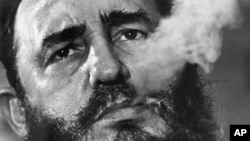Fidel Castro greeted his 80th birthday from his sickbed, gripping a newspaper to show he was alive two weeks after stepping down as president.
For the next 10 years the leader of the Cuban revolution watched from home as his brother Raul granted Cubans new economic freedoms and declared detente with the United States after a half-century of hostility.
When Fidel Castro turns 90 on Saturday, the man who nationalized the Cuban economy and controlled virtually every aspect of life on the island will celebrate his birthday in a far different country than the one he ruled.
Hundreds of thousands of Cubans are running private businesses, buying and selling their homes and cars, and checking the internet on imported cellphones. Castro's greatest ally, Venezuela, is in economic free-fall, cutting the flow of subsidized oil that Cuba has depended on. Tens of thousands of Cubans are emigrating to the United States, hollowing out the ranks of highly educated professionals.
The island's brightest economic hopes lie in a post-detente surge in tourism that is expected to boom when commercial flights to and from the United States, Cuba's longtime enemy, start again Aug. 31.
"The future lies with the young people and young Cubans aren't waiting for things to come to them," said Ernesto Gonzalez, a 25-year-old dance producer. "There's much more information than there was 50 years ago and this opening to the world, this new boom, Cuba as a top trending topic, makes us young people see things from a different perspective, in terms of developing this country and ourselves."
It's an uncertain time, with no settled consensus around Castro's legacy. The government and its backers laud his nationalism and his construction of a social safety net that provided free housing, education and health care to every Cuban. Less is said about decades of economic stewardship that, along with a U.S. trade embargo, has left Cuba's infrastructure and its economy cash-strapped and still dependent on billions in aid from abroad.
The Cuban government has taken a low-key approach to Castro's birthday. There are no big rallies or parades planned, no publicly announced visits by foreign dignitaries. Government ministries have held small musical performances and photo exhibitions that pay tribute to Fidel. An island-wide performance by children's choruses is the biggest event announced for Saturday.
The government hasn't even said if it will release photos or video of Castro, who last appeared in public in April, closing the twice-a-decade congress of the Cuban Communist Party with a call for Cuba to stick to its socialist ideals in the midst of normalization with the U.S.
His voice quavered but he appeared vigorous and healthy for a man of 89, whose long absences from the public eye have provoked speculation about his health ever since complications from gastrointestinal surgery forced him to hand power to his brother.
"Soon I'll be 90, something that never would have occurred to me," said Castro, the survivor of years of close-range fighting during the revolution and dozens of U.S.-sponsored assassination attempts after his victory. "Soon I'll be like all the others. Our time comes for all of us, but the ideas of the Cuban communists will endure."
That's an idea that receives a qualified endorsement from many Cubans, who are deeply disenchanted with the paltry salaries, shortages and paralyzing inefficiency that remain hallmarks of Cuba's centrally planned economy.
Many Cubans today openly describe themselves as capitalists, and say time has proven that Castro's economic ideas do not work. But others praise Cuba's low crime, its health and educational benefits, its investments in making cultural activities and sports available to all, and its support for putting family and friends before work obligations.
"The revolution has made a lot of mistakes but the Cuban people are believers in Fidel because his ideas were noble," said Marisel Avila, a 49-year-old singer. "We have to lift up our economy, without selling ourselves, without denying our history, but we can't live in the past, either."




